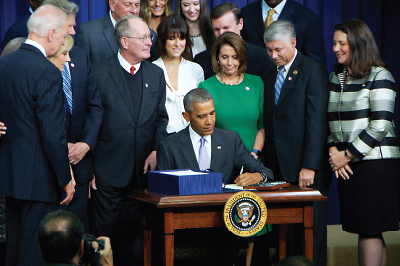President Barack Obama signed the wide-ranging $6 billion 21st Century Cures Act into law on December 13, 2016, a week after it passed by overwhelming margins in both the House of Representatives and Senate.
The law includes significant mental health and substance abuse treatment components as well as research funding for Obama’s Precision Medicine Initiative, the BRAIN initiative, and Vice President Joe Biden’s cancer “moonshot.” There are also provisions intended to speed up the Food and Drug Administration’s review of new drugs.
At the White House signing ceremony, the president thanked Democrats and Republicans who had worked together on the legislation.
“I’m confident that it will lead to better years and better lives for millions of Americans, the work that you’ve done,” said Obama. “I hope in the years ahead, Congress keeps working together in a bipartisan fashion to move us forward and not backward in the health of our people.”
Among other provisions, the law establishes an assistant secretary for mental health and substance abuse who will take over the functions of the current SAMHSA administrator. The assistant secretary will appoint a chief medical officer (CMO) to evaluate existing programs and promote evidence-based clinical care. The CMO will not necessarily be a psychiatrist, but the qualifications include holding a medical degree and having experience treating patients with mental illness or substance use disorders.
In addition, the law will promote workforce development and integrated care, strengthen enforcement of parity, and improve how the federal government finances and manages evidence-based mental health services.
“It was an honor to see the president sign this significant piece of legislation,” said APA President Maria A. Oquendo, M.D., Ph.D., who attended the ceremony. “This marks the passage of the first mental health reform bill in more than 50 years and is long overdue. We should enjoy this moment, but that does not mean our work is over.”
“Everything in the act has been authorized, and the continuing resolution that funds government operations until April 28 also appropriates $20 million for the FDA, $352 million for NIH, and $500 million in grants to states to combat the opioid abuse epidemic,” said Ariel González, J.D., M.A., chief of APA’s Department of Government Relations.
Obama noted that his administration’s health care reform efforts set the foundation for the 21st Century Cures Act, which now provides access to services for the 20 million Americans newly insured by the Affordable Care Act.
The law incorporates elements of legislation previously put forth by Reps. Tim Murphy (R-Pa.) and Eddie Bernice Johnson (D-Texas) in the Helping Families in Mental Health Crisis Act and the Mental Health Reform Act of 2016, sponsored by Sens. Chris Murphy (D-Conn.) and Bill Cassidy (R-La.). APA worked closely with those legislators over the past three years to help craft the mental health provisions in the final bill.
“In 2013, a group of Pennsylvania psychiatrists asked me to join in helping Rep. Murphy work on a new comprehensive mental health reform bill,” recalled APA CEO and Medical Director Saul Levin, M.D., M.P.A. “It took three years working with Rep. Murphy to reach the final bipartisan law included in the 21st Century Cures Act. I am proud that APA signed on from the beginning, and that APA President Maria Oquendo, M.D., Ph.D., could attend the signing by President Obama.”
To combat the opioid epidemic, the law provides $1 billion over two years to bolster prescription drug monitoring programs, implement prevention activities, provide training for health care providers, and expand access to opioid treatment programs.
The law also supports recruitment, training, and retention of the mental health workforce by authorizing a demonstration program that provides five-year grants for residents and fellows who practice psychiatry and addiction medicine in underserved communities. Other mental health clinicians are eligible for similar grants.
The act calls for “clarification” of the uses and disclosures of health information covered by the Health Information Portability and Accountability Act (HIPAA), a longstanding complaint of patients’ families. ■
“Remarks by the President and the Vice President at the 21st Century Cures Act Bill Signing” can be accecssed
here.

